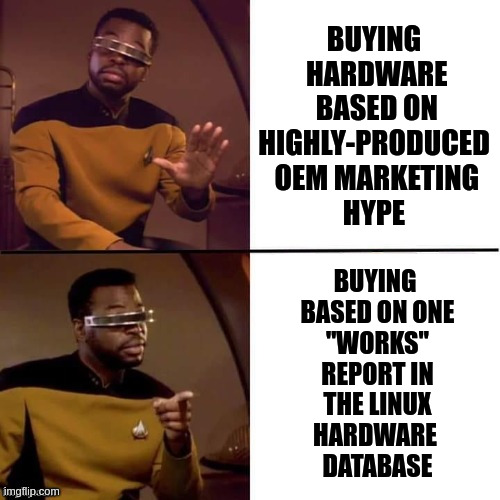this post was submitted on 28 Mar 2025
930 points (99.9% liked)
linuxmemes
24192 readers
1883 users here now
Hint: :q!
Sister communities:
Community rules (click to expand)
1. Follow the site-wide rules
- Instance-wide TOS: https://legal.lemmy.world/tos/
- Lemmy code of conduct: https://join-lemmy.org/docs/code_of_conduct.html
2. Be civil
3. Post Linux-related content
sudo in Windows.4. No recent reposts
5. 🇬🇧 Language/язык/Sprache
6. (NEW!) Regarding public figures
We all have our opinions, and certain public figures can be divisive. Keep in mind that this is a community for memes and light-hearted fun, not for airing grievances or leveling accusations.Please report posts and comments that break these rules!
Important: never execute code or follow advice that you don't understand or can't verify, especially here. The word of the day is credibility. This is a meme community -- even the most helpful comments might just be shitposts that can damage your system. Be aware, be smart, don't remove France.
founded 2 years ago
MODERATORS
you are viewing a single comment's thread
view the rest of the comments
view the rest of the comments

relevant
I've never had an issue personally
I'm not sure why you are latching on to almost. There will always be that 1%.
Well, to add my personal experience to yours, I've personally bought an off-the-shelf laptop "optimized for Linux" (from Tuxedo, to be clear). That should work just fine, shouldn't it? As it turns out, energy management does not, which is kind of essential, at least with a standard Linux installation that is not their own Ubuntu-based distribution or standard Ubuntu. They provide a management tool, but you need to build it yourself and the process is not documented properly. You'll need some experience and be able to interpret error messages in a terminal to find out where the issue is. Setting it up to start automatically on the next boot is another hurdle. I think that's not very nice, especially with this "optimized for Linux" claim. that might target newcomers in particular who try to avoid such issues.
The tool also requires a lot of additional node.js bloat, just to get your fans work properly and your laptop not to overheat. Sleep/hibernation also does not work properly outside their own OS/Ubuntu, and their advanced management tool with additional features does not work at all outside of Ubuntu/their derivate.
I've been there in the early 2000s, fighting with my network and graphics cards and I know it all got much better. Especially now that Nvidia support seems to finally become better. But let's not pretend issues don't exist?
That's my point. The state of Linux is very different now and manufacturers work to make sure that there devices have official Linux support. If you go with a well known brand you won't have issues.
Bragging about using Linux for 20 years doesn't work for something that changes rapidly.
That was not meant to be a brag, just to show that this is not a beginner's problem and that I can compare the change over time a bit. Linux still suffers from hardware support issues. Linux also supports a range of (older) hardware much better than others, but let's not pretend this is solved.
Good for you that the things you happen to have bought work for you, but that's just anecdotal evidence.